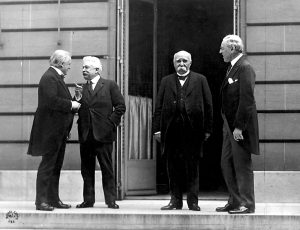Thomas Woodrow Wilson (1856-1924) was the 28th president of the United States. He was in office for two terms, from 1913 to 1921. During his time as president, he led America through World War 1. His efforts in international diplomacy and the promotion of democracy helped shape the post-war world. Despite his great achievements, Wilson’s presidency was also marked by several controversies and failures.
Initial Stance of Neutrality
When World War 1 broke out in Europe in 1914, Wilson was reluctant to enter the war, as he had promised during his presidential campaign. In fact, his slogan was “He kept us out of war.” He believed that America should stay out of European affairs and wanted to focus on domestic issues instead. Additionally, Wilson did not want to risk losing American lives in a foreign war, so the United States adopted a policy of neutrality.
In a letter to a friend that he sent before his inauguration, he even wrote, “It would be the irony of fate if my administration had to deal chiefly with foreign affairs.” During his second term, Wilson would be forced to deal with international affairs more than he ever wanted to.
Entering the War
In 1917, German submarines launched attacks against American merchant ships, and the United States found out that Germany was secretly trying to form an alliance with Mexico against America in what came to be known as the “Zimmerman Telegram.”
Wilson gave a speech to Congress on April 2, 1917, asking for a declaration of war against Germany. In his address, he outlined America’s reasons for entering the war. He said that it was not because they had to protect the country from an imminent attack but because they had to destroy German autocracy. He also promised that America would make the world “safe for democracy.”
By entering the war, America helped turn the tide in favor of the Allies. Wilson also had a hand in shaping the post-war world through his Fourteen Points plan, which proposed various solutions to the problems that had led to the war. The plan included measures such as self-determination, free trade, and disarmament.
The Controversial Treaty of Versailles
After the war ended in 1918, Wilson went to France to participate in the peace negotiations. He was optimistic that he could achieve a just and lasting peace. However, the other world leaders were not as invested in Wilson’s principles as he was. They were primarily concerned with punishing Germany and making sure that it could never start another war.
Wilson’s idealistic plans were quickly dashed as the other leaders began to create their own separate treaties with Germany. The most controversial agreement was the Treaty of Versailles in 1919, which placed harsh restrictions on Germany. The Allies divided German territory among themselves and limited the German military. The treaty led to a lot of resentment in Germany, which eventually paved the way for the rise of Adolf Hitler and the Nazi party.
In America, Wilson’s failure to achieve his goals during the peace negotiations was seen as a disappointment. His health also deteriorated during this time, and he suffered a stroke in October 1919 that left him paralyzed on one side of his body.
